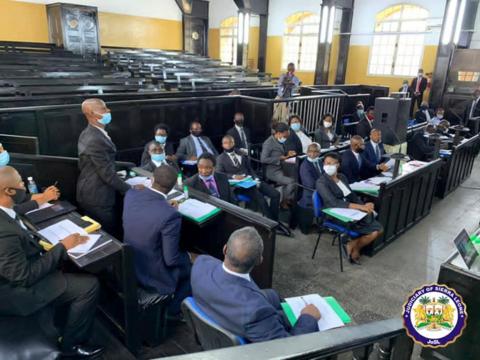By Francis H. Murray
The Judiciary of Sierra Leone has completed a three-day training program for all its magistrates to build their capacity and ensure efficient service delivery in their courtrooms.
Speaking at the opening ceremony on Thursday, 27th January 2021 at the main Law Courts building in Freetown, Chief Justice Desmond Babatunde Edwards said over the years magistrates have been constrained with issues bordering on the sentencing guidelines which he said has resulted in some magistrates handing down sentences significantly above their powers.
He described such an act as unfair considering the fundamental rights of inmates and those serving unfair jail terms.
He said the need for the training came out of a personal visit he made to the Male Correctional Centre in 2019 where he had a one-on-one welfare-centered conversation with inmates and the authorities.
He disclosed that the findings from that visit provoked him to begin a summary review of cases pursuant to Cap 17 of the Laws of Sierra Leone adding that he was committed to assigning judges specifically for that purpose.
He stressed that because it was the first time the judiciary through the Judicial and Legal Training Institute (JLTI) was providing training for all magistrates in the country, he was optimistic that the endeavor would yield its expected result and “after this training, I will be observing your work to ensure that justice is dispensed without favor and according to law at all times.”
Making a presentation on the jurisdiction of Magistrates, Supreme Court Judge Nicholas Browne-Marke said any offence punishable by sentence of imprisonment for a term not exceeding five years, or a fine not exceeding one million falls within their Jurisdiction.
On the conduct and ethics of judicial officers in light of the Anti-corruption laws, Justice Reginald Fynn stressed that magistrates should be knowledgeable about the government's commitment to the fight against corruption.
He warned that the Judiciary had no room for any practice that will bring the name of the institution into disrepute and urged the magistrates to “effectively and accurately read the Judicial Code of ethics for effective service delivery.”
The training also looked at various issues including the conduct of preliminary investigations, environmental law, and prosecution of Social Security cases and handling a coroner’s inquest. It will also address issues ranging from the execution of bail regulations, sentencing guidelines, taking of evidence, adjournments, and the management and treatment of children and other vulnerable persons.
Copyright © 2021 Politico Online








